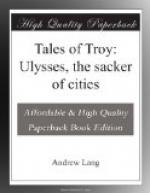“But perhaps,” he said, “you are no mortal woman, but some goddess who favours the Trojans, and if indeed you are a goddess then I liken you to Aphrodite, for beauty, and stature, and shapeliness.” Then Helen wept; for many a year had passed since she had heard any word of her father, and daughter, and her brothers, who were dead, though she knew it not. So she stretched out her white hand, and raised the beggar, who was kneeling at her feet, and bade him follow her to her own house, within the palace garden of King Priam.
Helen walked forward, with a bower maiden at either side, and the beggar crawling after her. When she had entered her house, Paris was not there, so she ordered the bath to be filled with warm water, and new clothes to be brought, and she herself washed the old beggar and anointed him with oil. This appears very strange to us, for though Saint Elizabeth of Hungary used to wash and clothe beggars, we are surprised that Helen should do so, who was not a saint. But long afterwards she herself told the son of Ulysses, Telemachus, that she had washed his father when he came into Troy disguised as a beggar who had been sorely beaten.
You must have guessed that the beggar was Ulysses, who had not gone to Delos in his ship, but stolen back in a boat, and appeared disguised among the Greeks. He did all this to make sure that nobody could recognise him, and he behaved so as to deserve a whipping that he might not be suspected as a Greek spy by the Trojans, but rather be pitied by them. Certainly he deserved his name of “the much-enduring Ulysses.”
Meanwhile he sat in his bath and Helen washed his feet. But when she had done, and had anointed his wounds with olive oil, and when she had clothed him in a white tunic and a purple mantle, then she opened her lips to cry out with amazement, for she knew Ulysses; but he laid his finger on her lips, saying “Hush!” Then she remembered how great danger he was in, for the Trojans, if they found him, would put him to some cruel death, and she sat down, trembling and weeping, while he watched her.
“Oh thou strange one,” she said, “how enduring is thy heart and how cunning beyond measure! How hast thou borne to be thus beaten and disgraced, and to come within the walls of Troy? Well it is for thee that Paris, my lord, is far from home, having gone to guide Penthesilea, the Queen of the warrior maids whom men call Amazons, who is on her way to help the Trojans.”
Then Ulysses smiled, and Helen saw that she had said a word which she ought not to have spoken, and had revealed the secret hope of the Trojans. Then she wept, and said, “Oh cruel and cunning! You have made me betray the people with whom I live, though woe is me that ever I left my own people, and my husband dear, and my child! And now if you escape alive out of Troy, you will tell the Greeks, and they will lie in ambush by night for the Amazons on the way to Troy and will slay them all. If you and I were not friends long ago, I would tell the Trojans that you are here, and they would give your body to the dogs to eat, and fix your head on the palisade above the wall. Woe is me that ever I was born.”




